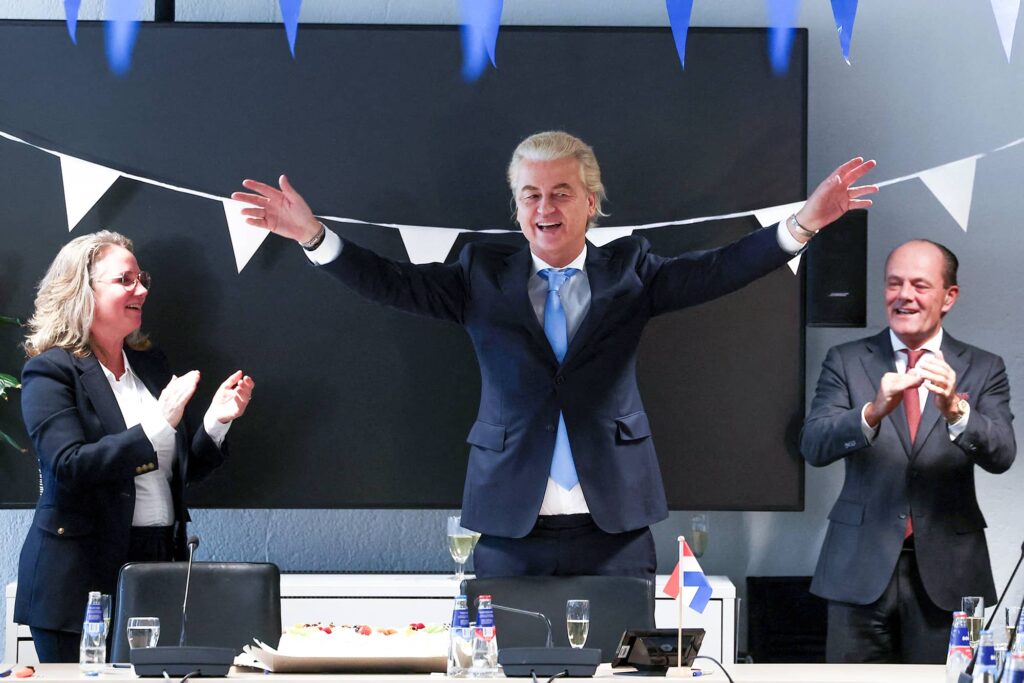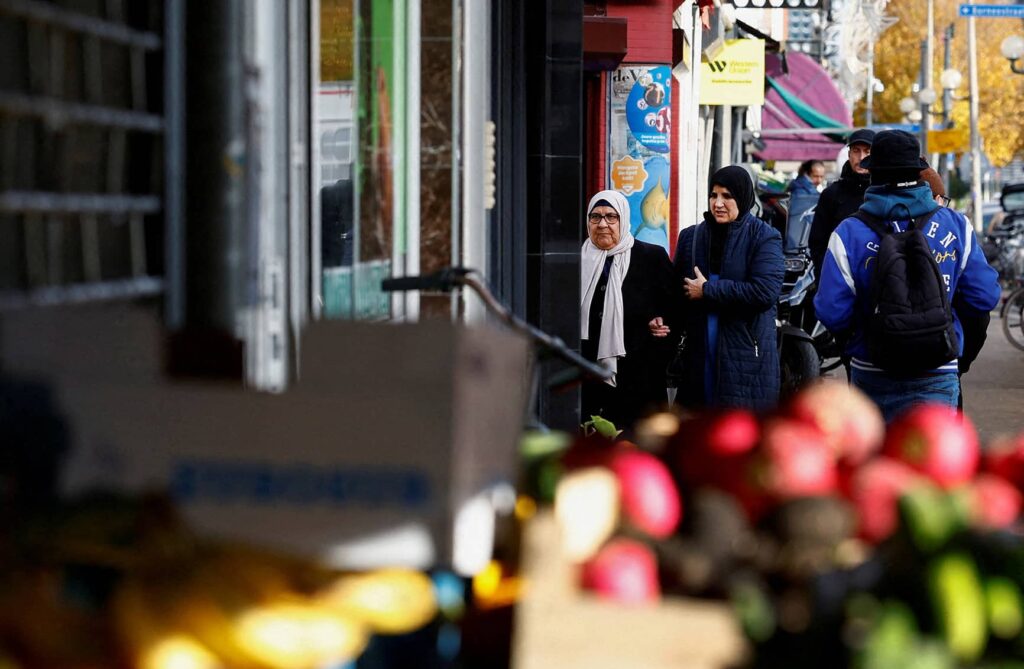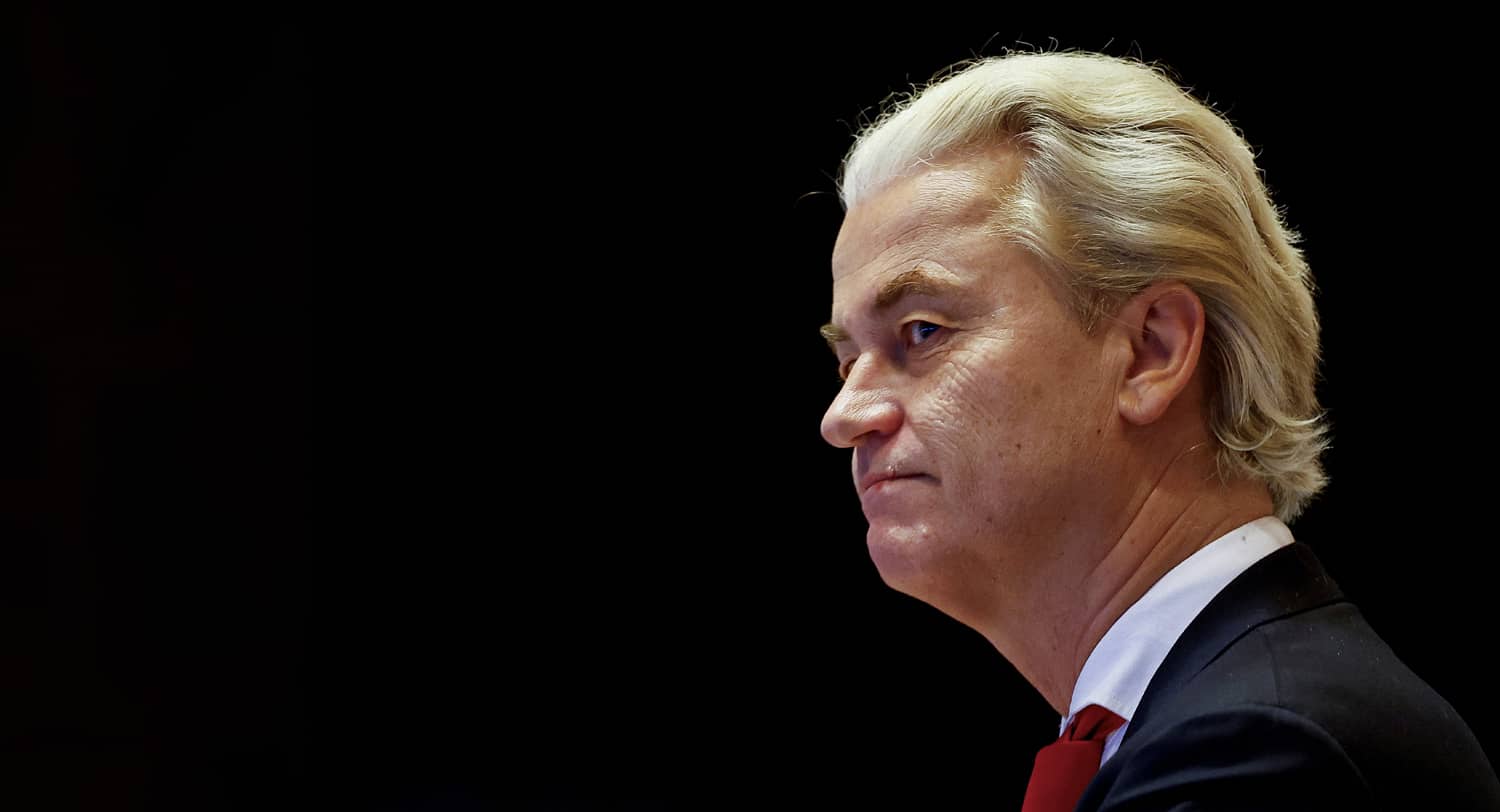A few days before the Dutch general election of November 22, 2023, the polls indicated a close finish. Each of three parties vying for the top position was expected to get just below 20 percent: Labor (in a common list with the Greens); the center-right Liberals; and the far-right Freedom Party. The winner would have a good chance to claim the prime ministership.
A Surprise Win for the Far-Right
The polls turned out to be wrong. The Freedom Party of Geert Wilder was the surprise winner with 25 percent of the vote and 37 of the 150 seats in the Second Chamber (House of Commons). Labor (25 seats) and Liberals (24 seats) were far behind. A new center party – The New Social Contract led by Christian-Democrat deserter Pieter Omtzigt – performed well, gaining 20 seats. For the first time in many years there is a fair chance for a rightist coalition cabinet to be formed.
Wilders’s success has sent a shockwave through Europe. Over the years, Wilders has been a prominent figure on the populist right of European politics, known for his critique of Islam. Owing to a life-threatening fatwa issued nearly 20 years ago, he lives under personal security protection. His triumph stems from the following three issues:
Mass immigration, accompanied by a growing influence of Muslims and fear that Christian norms and values are under threat;
Europeanization, symbolized by an impenetrable and highly paid European Commission bureaucracy and by the European Parliament that moves between conference halls in Brussels and Strasbourg at astronomical costs; and
Globalization, feeding popular distrust of multinational corporations that seemingly don’t care about national and local needs.
The victory of Wilders is a boon to the radical right throughout western Europe from the Flemish Interest in Belgium, Marine LePen’s National Rally in France, Vox in Spain, and Alternative for Germany. All of them, despite occasional setbacks, are on the rise but none have achieved direct power in government. In addition, Wilders may follow other far-right parties in countries where they are either in power or part of governing coalitions – Italy (Brothers of Italy), Hungary (Fidesz), Sweden (Swedish Democrats), Serbia (United Serbia), and until their failure in the recent elections, Poland (United Right).
Still, as of this writing in late December, it is doubtful whether he will become the next Dutch Prime Minister. The common wisdom in the Netherlands is one never knows what will be the final outcome of the coalition negotiations. But Wilders’s leverage in these negotiations will surely be on par with that of Italian Prime Minister Giorgia Meloni and to a lesser extent Hungary’s Prime Minister Victor Orban.
Behind Wilders’ Win
The rise to power of Wilders reflects widespread dissatisfaction, if not disaffection, of many in Europe towards the elites and especially the governmental authorities. But his achievements are also due to his political skills. During the electoral campaign he softened his stance on intensely disputed issues, and actually attained a kind of salonfähigkeit – social acceptability – which had been denied to him for years. His campaign thus could be a roadmap for other far-right politicians in Europe.
For more than twenty years Wilders had been an uncompromising politician, operating on the edges of the Dutch political order. In 2020, he was convicted by a court for a discriminatory statement about Moroccans.
During the recent campaign, Wilders softened his tone. The Liberal leader and, with some hesitation, the leader of the New Social Contract party both suggested during the campaign that they would not exclude the Freedom Party from a possible role in a future governing coalition. This time a vote for Wilders would not be wasted.

For his part, Wilders said he would be willing to put quite a few (clearly unconstitutional) party platform items between brackets for as long as his party would be in the next coalition cabinet. Other controversial campaign promises, including on international affairs, would be negotiable. He also indicated open-mindedness about his potential prime ministership, as long as his party’s position in the next coalition would reflect the election results.
Wilders policy positions also often find resonance in the Dutch public. He accused the government of failing to stand up against the “asylum tsunami.” He says Dutchmen “do not feel at home in their own land.” He embraces the German concept of the leitkultur – dominant culture – that feels threatened by Islamic law and culture.
Wilders and his Freedom Party echo what is commonly believed in the Netherlands – namely, that non-Western minorities are disproportionately represented among perpetrators of crime. There is some statistical support for this claim, e.g., in a study by the Research Center of the Ministry of Justice and Security. Wilders notes that the police cannot use algorithms to verify such statistics, since it would violate the constitution’s anti-discrimination article and be guilty of ethnic profiling.
In his party platform Wilders pleads for an opt-out on EU asylum and migration decisions and ‘’less Islam in The Netherlands.” He proposes to forbid the Koran and close mosques and Islamic schools. Last but not least, the manifesto wants to deny all asylum-seekers access to the country.
Still, it is not an aversion to asylum-seekers as such that would explain Wilders’s attraction. A majority in the Netherlands is willing to accommodate people fleeing from repression and war. But they do not accept economic migrants seen as taking advantage of Dutch social services. For instance, Dutch often are placed on waiting lists for years to acquire an affordable house or apartment. Those with asylum status are, under specific circumstances, given preferential treatment. In general, there is a growing distaste for the disproportionate use of public services by immigrants and their second and third-generation children.
Wilders and his Freedom Party can be described as populists. They are far-right on cultural issues, dismissing Islam as a perverse political ideology and detesting “Wokeism.” But in the socio-economic domain, they easily find common ground with leftist, indeed far-left parties. Without paying too much attention to financial rules and limitations, they endorse policies and measures which supposedly alleviate the toll of globalization on the working poor and those left behind. So they attract votes from both the right and the left side of the political spectrum.
Wilders’s unconditional emphasis on national identity and sovereignty implies a deep antipathy towards the European Union. His platform is crystal-clear: it is high time for a referendum on “Nexit,” i.e., Netherlands following Britain’s “Brexit.” As to the Islamic world, he suggests scaling back diplomatic relations with Islamic law-dominated countries. Wilders does not cast doubt on the relevance of NATO, but he wants NATO to expel Turkey.

Wilders is a firm supporter of Israel. He wants to move the Dutch embassy from Tel Aviv to Jerusalem. He has frequently said the Dutch diplomatic representation in Ramallah should be closed because “the Netherlands already has an embassy in Amman, the capital of the only true Palestinian state: Jordan.”
Here a personal note is in order. During my term in office as foreign minister (2010-2012), the Freedom Party gave parliamentary support to our minority coalition government. Wilders was very outspoken on the Israeli-Palestinian conflict. For instance, he did not talk about the West Bank but about Judea and Samaria. He attacked me for what I considered to be an even-handed approach to Israel and the Palestinian Authority, while the left and to a lesser extent the center parties characterized me as excessively pro-Israel. Wilders’ criticism usefully put distance between us, allowing me space to take issue with the all-too-pro-Palestine stance of the leftist parties. Our coalition fell when Wilders withdrew his parliamentary endorsement. It was a pity that he didn’t agree with me at the time that in the foreseeable future there would never be a government more willing to promote cordial relations with Israel. But I concluded that Israel was an important but not decisive issue for WIlders.
Conclusion – Looking Forward
As of December 2023, it is unclear what the next coalition cabinet will look like. Should the right fail to put together a stable coalition, the center-left would seek a coalition with the Liberals, but the gaps between their positions are probably too deep to bridge. Labor would have to glue together six or eight small parties, another unlikely option. The real alternative to a Wilders-based government (not necessarily with him as Prime Minister) would therefore be a new round of elections.
A new rightwing government would certainly prioritize efforts to curtail immigration. But the international outlook of the Netherlands – a loyal NATO ally and a solid member of the EU – would not change. Wilder already had to walk back the promise of a “Nexit.” But the next government and a majority in parliament would be more critical of Brussels, not least in the financial domain. With the elections for the European Parliament in June 2024, Brussels should be concerned that anti-European sentiments in the Netherlands will spread.
As for Dutch policy in the Middle East, the far-reaching proposals of Wilders on relations with Israel will not be acceptable to his potential coalition partners. Any new cabinet that includes Wilders will have its hands full to calm anger in Turkey and the Arab world about his conduct and statements over the years.
For Europe, the remarkable victory of Wilders and his Freedom Party should be a wake-up call of vital importance. Muddling through on core national interests, especially immigration and asylum policies, should be stopped. In the end, it is all about the necessity to guard and defend Western values against those who want to break them apart. The window of opportunity may be open to a European immigration pact and coordinated national efforts between the Netherlands and other countries, especially France and Germany.

